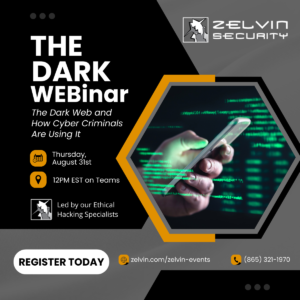
Dangers of the Dark Web
Dangers of the Dark Web
Dangers of The Dark Web: How to Reduce Your Risk
Navigating the Dark Webs: A Clear Guide
Beneath the familiar surface of the internet lies a hidden danger: the dark web. This platform poses serious risks to organizations, such as data breaches, financial harm, and a tarnished reputation. In this blog post, we'll dive into the dangers of the dark web, its common targets, and practical steps you can take to keep your valuable data from ending up in the wrong hands.
What is the Dark Web?
Imagine the dark web as a digital underground market, where anonymity is king, and illegal activities run rampant. It's a place where stolen data, counterfeit goods, and even cybercrime services are peddled without restraint. Your organization's sensitive information could be just a few clicks away from falling into the wrong hands.
What types of companies are a Top Targets?
- Any organization with data: Client data, employee data, student data, intellectual property, and credentials are just a few of the reasons why hacker’s exfiltrate data from organizations and sell it on the Dark Net.
- Financial Institutions: Banks, payment processors, and credit card companies are prime targets due to their treasure troves of financial data. Criminals hunt for credit card information, bank account credentials, and other financial details to fund their nefarious activities.
- Healthcare Sector: Medical records are a goldmine for cybercriminals, fetching high prices on the dark web. Stolen patient data can lead to identity theft, insurance fraud, and even compromised medical treatments.
- E-commerce Platforms: With the rise of online shopping, e-commerce platforms store vast amounts of customer data. Personal information, payment details, and purchase history are hot commodities for cybercriminals aiming to exploit unsuspecting shoppers.
- Tech Companies: Intellectual property theft is a grave concern for technology businesses. Proprietary source codes, trade secrets, and innovative ideas are all fair game for cybercriminals looking to profit from stolen innovation.
Any organization that stores personal data, financial information, and any other valuable data is at risk.
How Can I Defend My Organization?
- Up-to-date monitoring, alerting and defensive tools: Strengthen your cybersecurity posture with robust measures like firewalls, intrusion detection systems, and advanced malware protection. Regularly update and patch software to eliminate vulnerabilities that hackers could exploit.
- Employee Education: Your employees are the first line of defense. Train them in recognizing phishing emails, social engineering tactics, and the importance of strong, unique passwords. A well-informed team can thwart many potential breaches.
- Data Encryption: Encrypt sensitive data both in transit and at rest. Encryption adds an extra layer of security, making it significantly harder for cybercriminals to decipher stolen information. (If you’d like to learn more about the methods, here is a detailed resource on encryption Cryptography | NIST)
- Access Control: Implement strict access controls to limit who can access sensitive data. Not everyone in your organization needs access to everything. This reduces the chances of data exposure if a breach occurs.
- Regular Audits: Conduct regular security audits, such as penetration testing, to identify vulnerabilities and areas for improvement. This proactive approach helps you plug potential leaks before they become major breaches.
Wouldn’t it be powerful to know if a hacker can reach your backups or move from one area of your network to another? That’s what security testing can tell you!
- Dark Web Monitoring: Consider employing specialized services that monitor the dark web for any mention of your organization's data. If your information surfaces, you can take swift action to mitigate the damage.
Final Thoughts:
The dark web's dangers are real and can have devastating consequences for organizations and businesses. By understanding the risks and identifying potential targets, you can minimize the chance of your data ending up in the hands of cybercriminals.
When it comes to securing your digital assets, proactive measures are always more valuable reactive responses.
Remember, a solid cybersecurity strategy isn't just about protecting your business; it's about maintaining the trust of your customers and partners as well.
Click the link below to register for our online event The Dark Webinar on August 31st at 12pm EST.

Penetration Testing and Cyber Security Consulting | Zelvin Security
Join the Ethical Hackers at Zelvin Security for a 30-minute conversation on the Dark Web and how cybercriminals are using it today. Bring your questions and stay after the presentations for a Q&A session with the Zelvin Security team!
In the diverse landscape of cybersecurity, two distinct yet collaborative providers play pivotal roles in defending your digital space: IT Providers and Ethical Hackers. While their ultimate goal is to enhance the security posture of organizations, they approach the task…
More digital tools = more cyber risks. Does your organization use technology? Do you store client, employee, and confidential data? Few can say no, as business are efficiently scaled using digital tools to automate operations, store data, and communicate internally…
The 7 important cybersecurity strategies you can implement TODAY to help protect your network against malicious hackers. There were 28,775 known vulnerabilities in 2023, which is the highest ever recorded by National Institute of Standards and Technology in the National…
39 Cybersecurity experts, including Zelvin Security’s President, Jeff Atkinson, took to LinkedIn to address the effectiveness of vulnerability scanners to proactively protect your network. What is a vulnerability scanner? These are software applications that scan a network for known vulnerabilities….
K-12 Education Cybersecurity is increasingly more important for school district officials. Security is worth the investment.
As a proud supporter of the East Tennessee Economic Council (ETEC) community, Zelvin Security presents the following information as a guide to improve the cybersecurity programs of ETEC member organizations. One of the challenges all business leaders face is finding…
These are the core values that guide the daily work of Zelvin Security, a cybersecurity consulting firm.
Because securing digital assets is as important as locking an office door. Cybersecurity isn’t just a “nice-to-have" - It’s a must to keep your financial health and reputation intact.
Strengthen the cybersecurity of third-party vendors to enhance your organizations security posture. Use the resources in this article as a starting point to implement proactive measures.
How to Efficiently Allocate Cybersecurity Funds The economy has become more reliant on digital assets than ever before. Cybercrime is at its highest. The cost and consequences of data breaches are on the rise. This means we have to…










